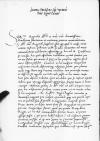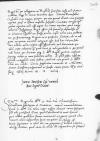Serenissimae Maiestati Vestrae Reginali supplices gratias ago, quod in causa, cuius ratione testium picturam vidit, se adeo clementem ad meas commendaticias exhibuerit effeceritque, quod ⌊huc⌋ ad ⌊dominos consiliarios⌋ sit remissa. Haec, quali affectione tractabitur, exitus docebit. Per me non stabit, quominus id fiat in hoc perplexo negotio, quod mera iustitia postulat. Creverunt in his novissimis temporibus conscientiae vinculo observantiaque religionis soluta, qua plurimi modo neque Deum, neque homines verentur, tam perversae mentes, ut difficile sit cognitu, cui tuto credi possit. In hac tamen causa, licet satis obscura videatur, sunt non dubia, quo se referat aequitas, indicia; quae utcumque aliquando opprimitur, semper tamen in lucem erumpit.
Deberem quidem Serenissimae Maiestati Vestrae, ut mihi iniunxit, nova, quae huc afferuntur, scribere, verum pauca et ea in<c>erta admodum hic accipimus. De serenissimo ⌊rege Angliae⌋ narratur, quod numerosum congerat pro ⌊caesare⌋ exercitum, quodque non paucos equites et pedites suis stipendiis in ⌊Germania⌋ conscribi faciat. ⌊Rex Daniae⌋ occlusas tenet ⌊freti sui⌋ angustias et neminem per eas transmittere statuit, quod non parum rei publicae ⌊regni⌋ et hic nostrae incommodabit. Dicitur tamen, ut pacem assequi possit (qui prior bellum indixit), ad ⌊caesarem⌋ ⌊quatuor oratores⌋ misisse, et quod eam ⌊Spirae⌋ in ⌊comitiis imperii⌋ illustrissimus ⌊lantgrabius Hassiae⌋ cum ⌊Meckelburgensi⌋ et ⌊Lunenburgensi⌋ ducibus tractandam susceperint. Quae tractatio, nisi opera serenissimi
⌊regis⌋ nostri per allegatum ⌊eo⌋ nuntium serio fiet, cassa mihi futura videtur.
Neque hoc novum tacendum duxi: citatos ⌊proconsules Gdanenses⌋ cum magna pompa per non paucos obvios eius societatis equites quasi re optime confecta susceptos ⌊civitatem⌋ intrasse. Quod quidem ingratum mihi esse nequit, hoc tamen non item, quod vulgo iactatur, instigatorem regii officii sub scamnum se abscondisse et in citatorum aspectum non fuisse prodire ausum, velim enim auctoritatem existimationemque regiam in ea praesertim ⌊civitate⌋, ubi in religione non parum variatur, integram esse. Sed haec his pro fide mea addita nolim cuipiam esse offendiculo vel detrimento, qui nihil cupio ardentius, quam quod locus is mihi genitalis, in quo primam vidi lucem, per divinam atque Serenissimae ⌊Maiestatis Regiae⌋ gratiam cresceret fieretque in dies in omni felicitate auctior.
Si quid postea resoluta glacie navigabile mare factum attulerit, cum primis Serenissimam Maiestatem Vestram non celabo.
Cui me suppliciter commendo et a Domino Deo aetatem diutissime prosperrimam et fausta omnia precor.

